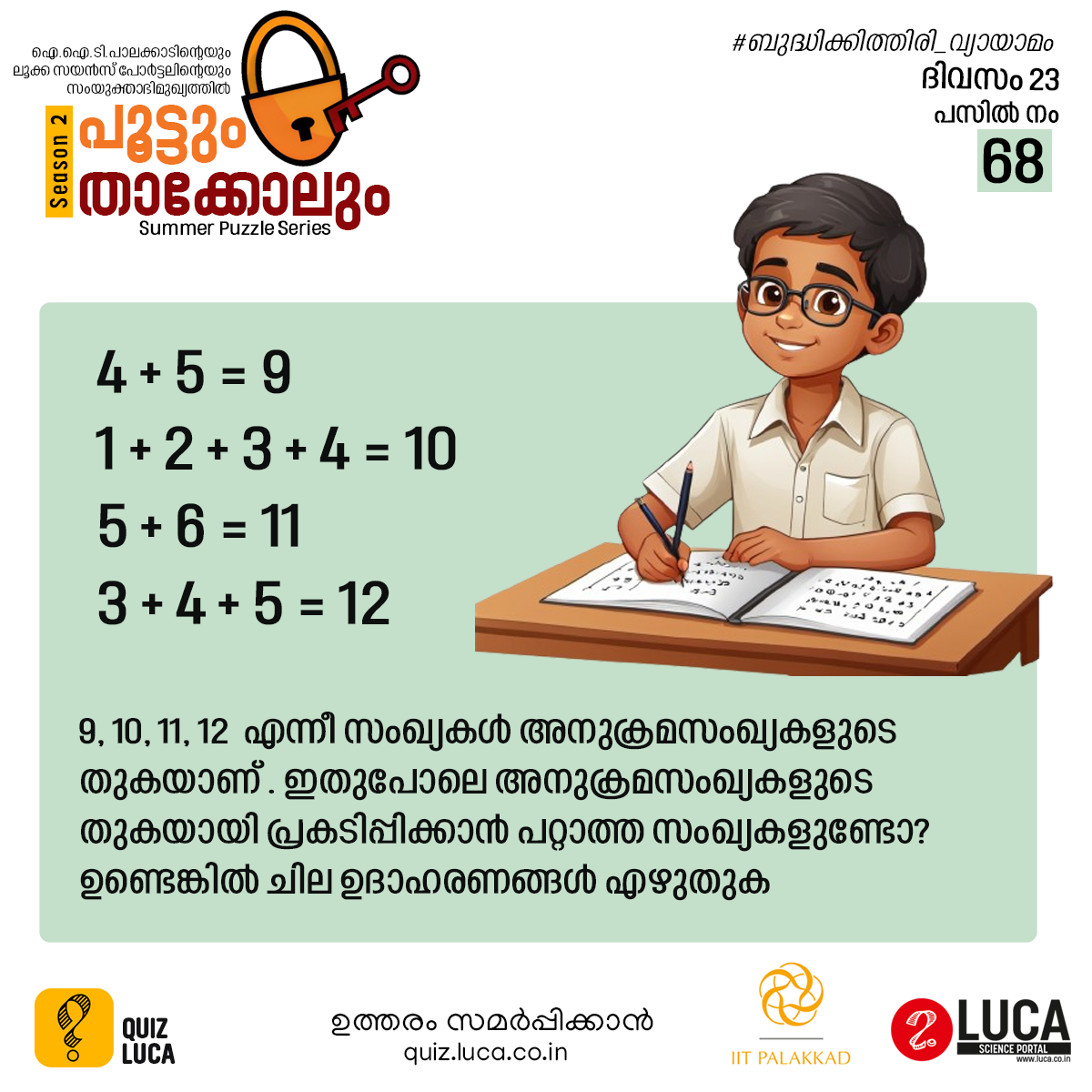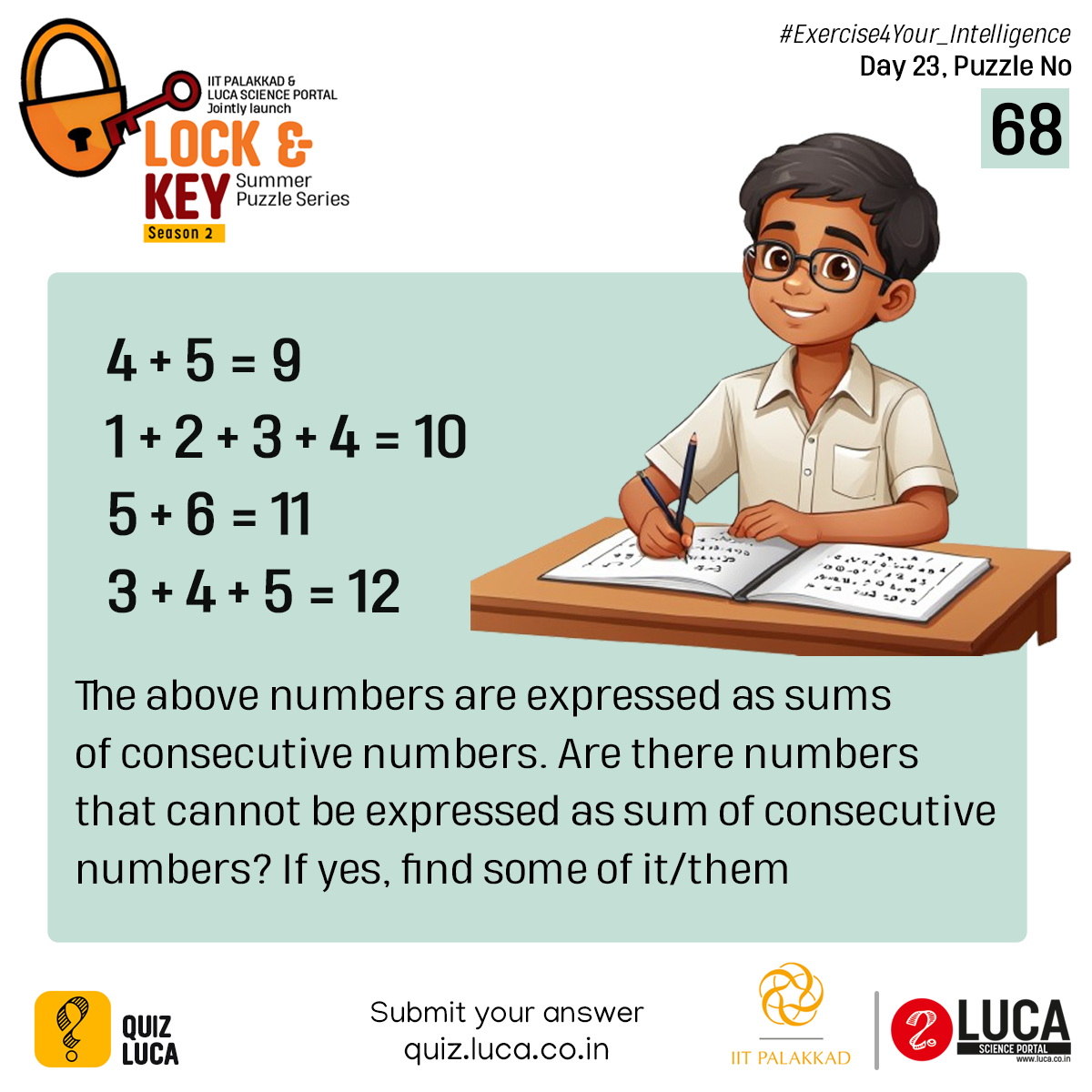

Solution:
S എന്നത് തുടർച്ചയായ k എണ്ണൽ സംഖ്യകളുടെ ആകെത്തുക ആയിരിക്കട്ടെ
( S = n+(n+1)+ …+(n+ k-1) ) .
അപ്പോൾ S = (ആദ്യ പദം+അവസാന പദം)*k/2 = (2n + k – 1)k/2. ഈ രണ്ട് സംഖ്യകളിൽ ഒന്ന് – k അല്ലെങ്കിൽ (2n+k-1) – ഒറ്റസംഖ്യ ആയതിനാൽ , S-ന് ഒന്നിനേക്കാൾ വലിയ ഒരു ഒറ്റ സംഖ്യാ ഘടകം ഉണ്ടായിരിക്കണം.
2, 4, 8, … പോലെയുള്ള രണ്ടിന്റെ ഘാതങ്ങളുടെ എല്ലാ ഘടകങ്ങളും ഇരട്ട സംഖ്യകളായിരിക്കും. (അഭാജ്യ ഘടകമായി 2 മാത്രമേ ഉള്ളൂ ) അതുകൊണ്ടു ഇവയെ അനുക്രമസംഖ്യകളുടെ തുകയായി എഴുതാൻ കഴിയില്ല.
Note: ഉമേഷിന്റെ ഉത്തരത്തിൽ പറഞ്ഞിട്ടുള്ളത് പോലെ നെഗറ്റീവ് സംഖ്യകളും പൂജ്യവും അനുവദിക്കുകയാണെങ്കിൽ ഏതു സംഖ്യയെയും തുടർച്ചയായുള്ള സംഖ്യകളുടെ തുകയായി എഴുതാം -(n – 1) + -(n -2) + …+ 0 + 1 + 2…+ (n-2) + (n-1) + n
Let S be the sum of k consecutive counting numbers: n, n+1, …, n+ k-1.
Then S = num of terms * (first term + last term)/2 = k(2n + k – 1)/2. Since one of the two numbers – k or 2n + k-1 – is odd, S should have an odd factor that is greater than 1. Powers of 2 like 2, 4, 8, … do not have odd factors and are therefore not expressible as sum of consecutive numbers.
Note: As pointed out by Umesh in his solution, If we do not insist on the set of consecutive numbers being positive integers and allow negative integers as well, any number n can be expressed as a sum of consecutive integers as -(n – 1) + -(n -2) + …+ 0 + 1 + 2…+ (n-2) + (n-1) + n
Best Explanation : Umesh P Narendran
നെഗറ്റീവ് സംഖ്യകളെയും പൂജ്യത്തെയും ഉൾക്കൊള്ളിക്കാൻ പറ്റുമെങ്കിൽ, n എന്ന സംഖ്യ കിട്ടാൻ -(n-1) മുതൽ n വരെയുള്ള സംഖ്യകൾ കൂട്ടിയാൽ മതി.
ഉദാ: 4 = -3 + -2 + -1 + 0 + 1 + 2 + 3 + 4.
എണ്ണൽസംഖ്യകൾ മാത്രമേ പറ്റൂ എങ്കിൽ നമുക്കു നോക്കാം.
നമുക്ക് പല സംഖ്യകളുടെ തുകയായി എഴുതേണ്ട സംഖ്യയെ “വലിയ സംഖ്യ” എന്നും തുകയിലെ ഓരോ സംഖ്യയെയും “ചെറിയ സംഖ്യ” എന്നും, ചെറിയ സംഖ്യകളുടെ എണ്ണത്തെ “എണ്ണം” എന്നും പറയാം.
സിദ്ധാന്തം: ഒരു വലിയ സംഖ്യയെ ചെറിയ അനുക്രമസംഖ്യകളുടെ തുകയായി എഴുതാൻ പറ്റണമെങ്കിൽ വലിയ സംഖ്യയ്ക്ക് ഒരു ഒറ്റസംഖ്യ ഘടകമായി ഉണ്ടാവണം.
(This is a necessary condition. Not necessarily sufficient.)
തെളിവ്:
എണ്ണം ഒറ്റസംഖ്യയാണെങ്കിൽ നടുക്കുള്ള ചെറിയ സംഖ്യ ചെറിയ സംഖ്യകളുടെ ശരാശരി ആയിരിക്കും. അതും എണ്ണവും കൂടി ഗുണിച്ചാൽ വലിയ സംഖ്യ കിട്ടും. അതായത്, വലിയ സംഖ്യയ്ക്ക് ഒരു ഒറ്റ സംഖ്യയെങ്കിലും ഘടകമായി ഉണ്ടാകും. (ഇവിടെ എണ്ണം ഒറ്റസംഖ്യയാണല്ലോ.)
എണ്ണം ഇരട്ടസംഖ്യയാണെങ്കിൽ വലിയ സംഖ്യ = എണ്ണം x (നടുക്കുള്ള രണ്ടു ചെറിയ സംഖ്യകളുടെ ശരാശരി). നടുക്കുള്ള രണ്ടു സംഖ്യകൾ k, k+1 എന്നിവയാണെന്നിരിക്കട്ടേ.
വലിയ സംഖ്യ = (k + k + 1) / 2 * എണ്ണം
എണ്ണം ഇരട്ടസംഖ്യയായതിനാൽ (എണ്ണം / 2) ഒരു പൂർണ്ണസംഖ്യയായിരിക്കും. അതായത്,
വലിയ സംഖ്യ = (2k + 1) * ഒരു പൂർണ്ണസംഖ്യ
അതായത്, വലിയ സംഖ്യയ്ക്ക് ഒരു ഒറ്റസംഖ്യ ഘടകമായി ഉണ്ടാവണം.
അപ്പോൾ, ഒരു ഒറ്റസംഖ്യ ഘടകമായി ഇല്ലാത്ത സംഖ്യകളൊന്നും അനുക്രമസംഖ്യകളുടെ തുകയായി എഴുതാൻ പറ്റില്ല.
അതായത്, രണ്ടിന്റെ ഘാതങ്ങൾക്ക് (2, 4, 8, 16, …) ഒന്നിനും അനുക്രമസംഖ്യകളുടെ തുകയാകാൻ പറ്റില്ല.
(രണ്ടിന്റെ ഘാതമല്ലാത്ത വലിയ സംഖ്യകളെല്ലാം അനുക്രമസംഖ്യകളുടെ തുകയായി എഴുതാൻ പറ്റുമോ എന്നു വ്യക്തമല്ല. പക്ഷേ അത് ഈ ചോദ്യത്തിൽ പ്രസക്തമല്ല.)
| Attempts | 74 |
| Correct | 17 |
| Best Explanation | Umesh P Narendran |
First 10 Correct Answers
| Sl No | Primary | High School | Others |
| 1 | Chaithanya Manohar | Divyashree. M | Sangeetha. K |
| 2 | Reshma | Sivananda. E | Umesh P Narendran |
| 3 | Niwin Varghese Mathews | Ruben B Mathew | Dhanu |
| 4 | _ | Mathew George David | _ |
| 5 | _ | Mithra vimal | _ |
| 6 | _ | Ananda Lakshmi A | _ |
| 7 | _ | Aadidev p | _ |
| 8 | _ | Revathi.k | _ |
| 9 | _ | Bewin Wilson Mathews | _ |
| 10 | _ | _ | _ |
